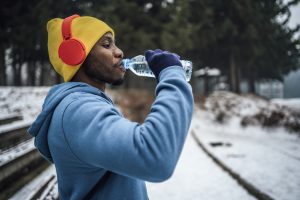 Dehydration in the winter may seem less likely than in the summertime, but it is still a risk. According to the U.S. National Academies of Sciences, Engineering, and Medicine, the recommended amount of daily fluid intake is around 15.5 cups for men and 11.5 for women. For many of us, it might be harder to reach these quantities during the winter months.
Dehydration in the winter may seem less likely than in the summertime, but it is still a risk. According to the U.S. National Academies of Sciences, Engineering, and Medicine, the recommended amount of daily fluid intake is around 15.5 cups for men and 11.5 for women. For many of us, it might be harder to reach these quantities during the winter months.
Some causes of winter dehydration include:
- Indoor heat
- Bundling up in too many layers
- Lack of thirst
- Fluid loss from respiration
- More frequent urination
There are many signs of dehydration, including:
- The color of your urine
- Constipation
- Fatigue
- Dry mouth and chapped lips
- Dry skin
- Headaches
- Difficulty concentrating
- Irritability
- Feeling faint or dizzy
- A rapid heart rate
Here are some tips for staying hydrated in the winter:
- Drink warm fluids if it is too difficult to drink cold water when it’s cold outside.
- Infuse plain water with flavor, by adding flavorings such as a wedge of lemon or lime, other pieces of fruit, or unsweetened water enhancers.
- Carry a reusable water bottle with you to encourage daily hydration.
- Eat homemade soups and water-rich fruits and vegetables to help increase fluid intake
- Avoid drinking caffeine as it can contribute to dehydration.
- Swap drinking an alcoholic beverage for a mocktail.
- Make hydration a routine by drinking a certain amount of water daily.
If you have symptoms of dehydration, consult a physician immediately. Severe cases can lead to complications and potentially death. For less severe cases, you can schedule an appointment with a physician at Jamaica Hospital Medical Center’s Ambulatory Care Center, by calling (718) 206-7001. If you are experiencing an emergency, call 911.
All content of this newsletter is intended for general information purposes only and is not intended or implied to be a substitute for professional medical advice, diagnosis or treatment. Please consult a medical professional before adopting any of the suggestions on this page. You must never disregard professional medical advice or delay seeking medical treatment based upon any content of this newsletter. PROMPTLY CONSULT YOUR PHYSICIAN OR CALL 911 IF YOU BELIEVE YOU HAVE A MEDICAL EMERGENCY.
